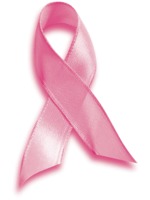Submitted by Diane Farsetta on
 This October is the 26th annual Breast Cancer Awareness month, an event "conceived by the pharmaceutical company Zeneca, now AstraZeneca ... to promote mammography as the most effective weapon in fighting breast cancer." The increasing number of pink ribbon / breast cancer cause-related marketing campaigns has the advocacy group Breast Cancer Action referring to October as "breast cancer industry month." Companies -- like Ty, which is offering "SpongeBob PinkPants" this October -- point out that they raise money for breast cancer research. "In 2005 alone, cause-related marketing generated more than $30 million for research and community programs for the Susan G. Komen Breast Cancer Foundation," reports Josephine Marcotty. Pink marketing also helps companies' bottom lines. Advertising Age reports that "by turning its iconic red-and-white soup cans pink for Breast Cancer Awareness Month, Campbell Soup Co. has doubled sales of its top varieties to its biggest grocery customer. ... [Campbell spokesman John] Faulkner said he would 'love to see the program expanded greatly next year.'"
This October is the 26th annual Breast Cancer Awareness month, an event "conceived by the pharmaceutical company Zeneca, now AstraZeneca ... to promote mammography as the most effective weapon in fighting breast cancer." The increasing number of pink ribbon / breast cancer cause-related marketing campaigns has the advocacy group Breast Cancer Action referring to October as "breast cancer industry month." Companies -- like Ty, which is offering "SpongeBob PinkPants" this October -- point out that they raise money for breast cancer research. "In 2005 alone, cause-related marketing generated more than $30 million for research and community programs for the Susan G. Komen Breast Cancer Foundation," reports Josephine Marcotty. Pink marketing also helps companies' bottom lines. Advertising Age reports that "by turning its iconic red-and-white soup cans pink for Breast Cancer Awareness Month, Campbell Soup Co. has doubled sales of its top varieties to its biggest grocery customer. ... [Campbell spokesman John] Faulkner said he would 'love to see the program expanded greatly next year.'"

Comments
Pani113 replied on Permalink
Thinking before you pink
Unfortunately, to "think before you pick" puts one in the same category with "pinkos," atheists and puppy kickers. Josephina public is so easily manipulated they don't understand this is just a huge marketing gimmick!
bhuston replied on Permalink
thanks!
I'm so glad you covered this in the Weekly Spin.
I volunteer for Binghamton Indymedia, and after watching several fake news stories about breast cancer (e.g., http://www.wicz.com/fox40/video.asp?video=6%2D5+Breast+Cancer%2Ewmv ), and I wanted to do an article about the connection between the PR industry and how the local news covers breast cancer.
I contacted about 8 women working in the local media, including the ACS spokeswoman. None would talk to me! http://home.stny.rr.com/bhuston/Breast%20Cancer%20Media%20Request%20w_responses.html
I then went to a breast cancer walk for "awareness", and noticed that a local dairy supplier had a big display. (Dairy is indicated as a cause of breast cancer). I approached with my camera rolling, started asking routine questions, "how much money did you raise last year", etc. When I asked what is the purpose of the event, one woman said "to get people to understand that early detection is the best way to fight the disease". I then asked if they ever heard of any risks of mammography, if they ever thought about the dangers of radiation. "Nah, it's all digital now" was the answer.
I then found a woman from the corporate media shooting b-roll of the event. I asked her if she wanted someone to speak about another side of this story, and she said "I don't want to get another side". I thought professional journalism was supposed to be about balance?
I had contacted eight women in the press. Coincidentally, this is the same number of police officers who escorted me out of the park.
http://www.infoshop.org/inews/article.php?story=20061001170648163
Outline of my prepared presentation about Breast Cancer vs. PR:
http://home.stny.rr.com/bhuston/breast%20cancer%20talk.html